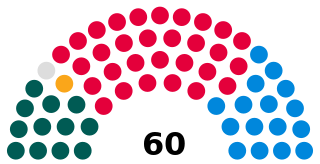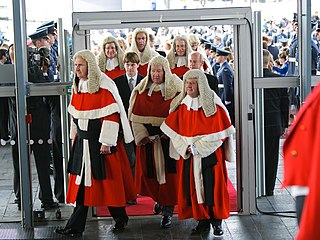Plaid Cymru is a centre-left to left-wing, Welsh nationalist political party in Wales, committed to Welsh independence from the United Kingdom.

The Senedd, officially known as the Welsh Parliament in English and Senedd Cymru in Welsh, is the devolved, unicameral legislature of Wales. A democratically elected body, it makes laws for Wales, agrees certain taxes and scrutinises the Welsh Government. It is a bilingual institution, with both Welsh and English being the official languages of its business. From its creation in May 1999 until May 2020, the Senedd was known as the National Assembly for Wales.

Adam Robert Price is a Welsh politician who served as Leader of Plaid Cymru from 2018 to 2023. He has been the Member of the Senedd (MS) for Carmarthen East and Dinefwr since 2016, having previously been a Member of Parliament (MP) for the same Westminster constituency from 2001 to 2010.

Welsh nationalism emphasises and celebrates the distinctiveness of Welsh culture and Wales as a nation or country. Welsh nationalism may also include calls for further autonomy or self determination which includes Welsh devolution, meaning increased powers for the Senedd, or full Welsh independence.

Politics in Wales forms a distinctive polity in the wider politics of the United Kingdom, with Wales as one of the four constituent countries of the United Kingdom (UK).

Welsh republicanism or republicanism in Wales is the political ideology of a Welsh republic, as opposed to Wales being presided over by the monarchy of the United Kingdom.

Welsh law is an autonomous part of the English law system composed of legislation made by the Senedd. Wales is part of the legal jurisdiction of England and Wales, one of the three legal jurisdictions of the United Kingdom. However, due to devolution, the law in Wales is increasingly distinct from the law in England, since the Senedd, the devolved parliament of Wales, can legislate on non-reserved matters.

Welsh independence is the political movement advocating for Wales to become a sovereign state, independent from the United Kingdom.

Plaid Cymru; The Party of Wales originated in 1925 after a meeting held at that year's National Eisteddfod in Pwllheli, Caernarfonshire. Representatives from two Welsh nationalist groups founded the previous year, Byddin Ymreolwyr Cymru and Y Mudiad Cymreig, agreed to meet and discuss the need for a "Welsh party". The party was founded as Plaid Genedlaethol Cymru, the National Party of Wales, and attracted members from the left, right and centre of the political spectrum, including both monarchists and republicans. Its principal aims include the promotion of the Welsh language and the political independence of the Welsh nation.
Full fiscal autonomy (FFA) – also known as devolution max, devo-max, or fiscal federalism – is a particular form of far-reaching devolution proposed for Scotland and for Wales. The term has come to describe a constitutional arrangement in which instead of receiving a block grant from the UK Exchequer as at present, the Scottish Parliament or the Senedd would receive all taxation levied in Scotland or Wales; it would be responsible for most spending in Scotland or Wales but make payments to the UK government to cover Scotland or Wales's share of the cost of providing certain UK-wide services, largely defence and foreign relations. Scottish/Welsh fiscal autonomy – stopping short of full political independence – is usually promoted by advocates of a federal United Kingdom.

In the United Kingdom, devolution is the Parliament of the United Kingdom's statutory granting of a greater level of self-government to the Scottish Parliament, the Senedd, the Northern Ireland Assembly and the London Assembly and to their associated executive bodies the Scottish Government, the Welsh Government, the Northern Ireland Executive and in England, the Greater London Authority and combined authorities.

Rhun ap Iorwerth is a Welsh journalist and politician serving as the Leader of Plaid Cymru. He has been the Member of the Senedd (MS) for Ynys Môn since 2013.

Unionism in Wales is the political view that supports a political union between Wales and the other countries of the United Kingdom. As well as the current state of the UK, unionism may also include support for Federalism in the United Kingdom and a United Kingdom Confederation.

Federalism in the United Kingdom aims at constitutional reform to achieve a federal UK or a British federation, where there is a division of legislative powers between two or more levels of government, so that sovereignty is decentralised between a federal government and autonomous governments in a federal system.

From 1999 to 2022 Wales has had a negative fiscal balance, due to public spending in Wales exceeding tax revenue. For the 2018–19 fiscal year, the fiscal deficit was about 19.4 percent of Wales's estimated GDP, compared to 2 percent for the United Kingdom as a whole. All UK nations and regions except for East, South East England and London have a deficit. Wales' fiscal deficit per capita of £4,300 is the second highest of the economic regions, after the Northern Ireland fiscal deficit, which is nearly £5,000 per capita.

Welsh devolution is the transfer of legislative power for self-governance to Wales by the Government of the United Kingdom.

A British confederation or a confederal UK has been proposed as a concept of constitutional reform of the United Kingdom, in which the countries of the United Kingdom; England, Scotland, Wales, as well as Northern Ireland become separate sovereign states that pool certain key resources within a confederal system with a central authority. Under the system, the central authority exists with the consensus of the constituent countries, which also maintain a right to seccession, if they wish.

A referendum on Welsh independence from the United Kingdom (UK) has been proposed by pro-independence supporters, including independence campaign group YesCymru, pro-independence political party Plaid Cymru and other groups and individuals.
There have been calls for further Welsh devolution and autonomy for Wales since the Welsh legislature of the Senedd was founded following the 1997 Welsh devolution referendum.














